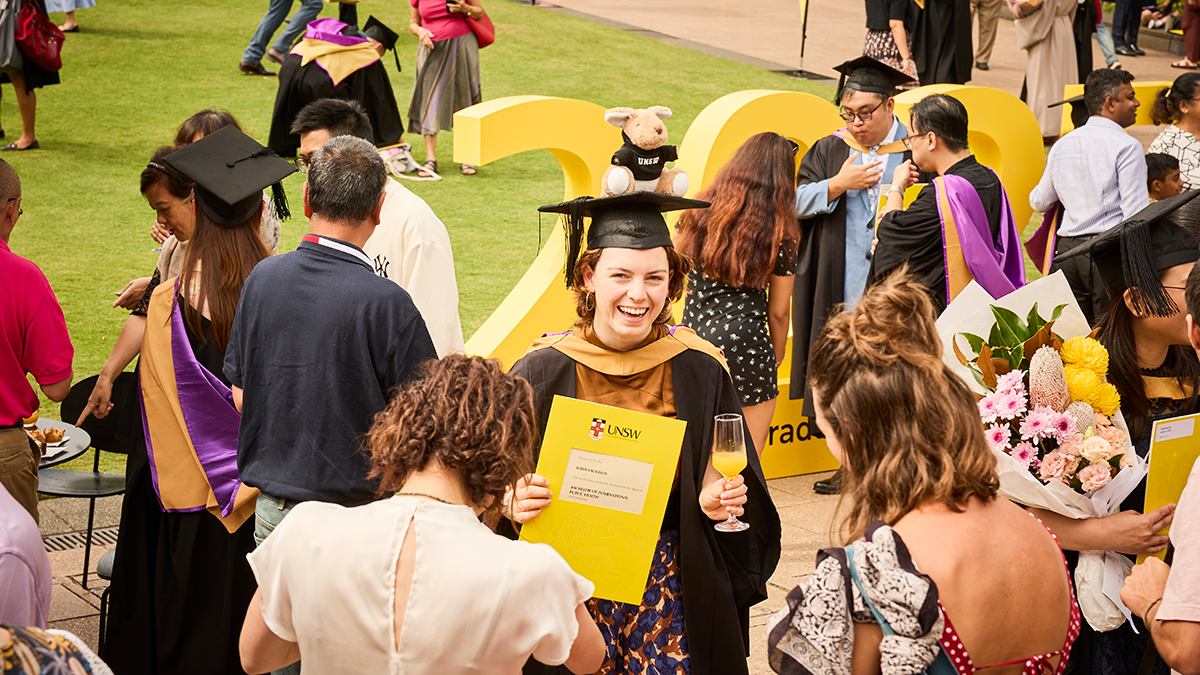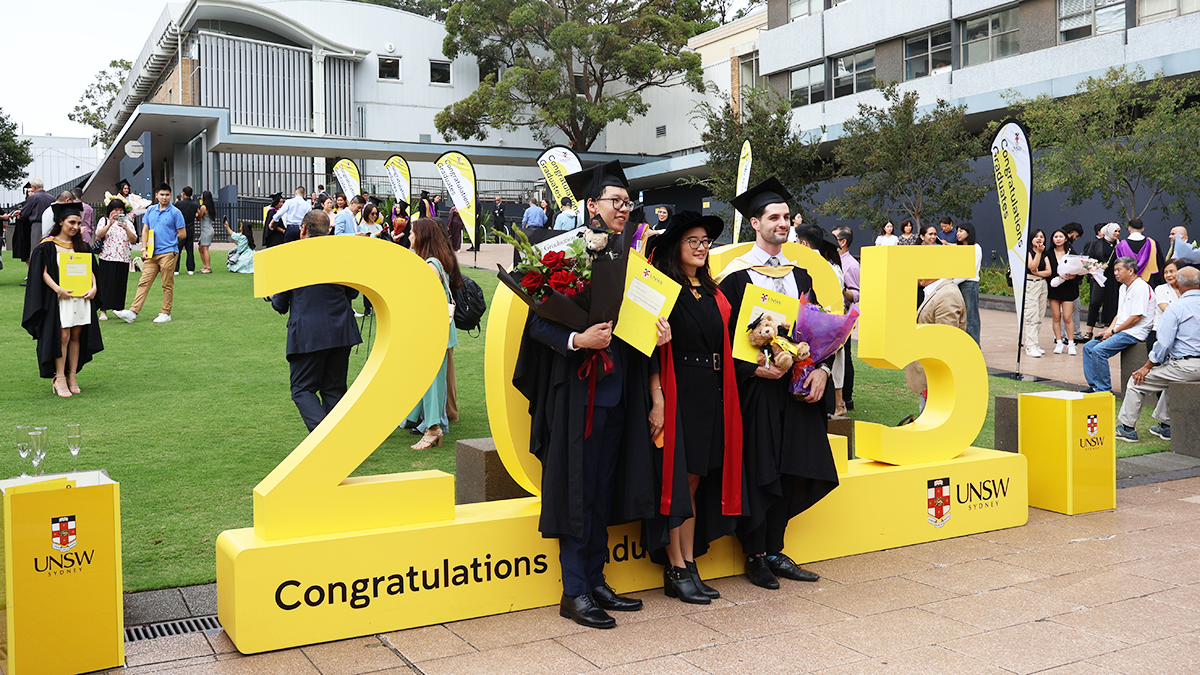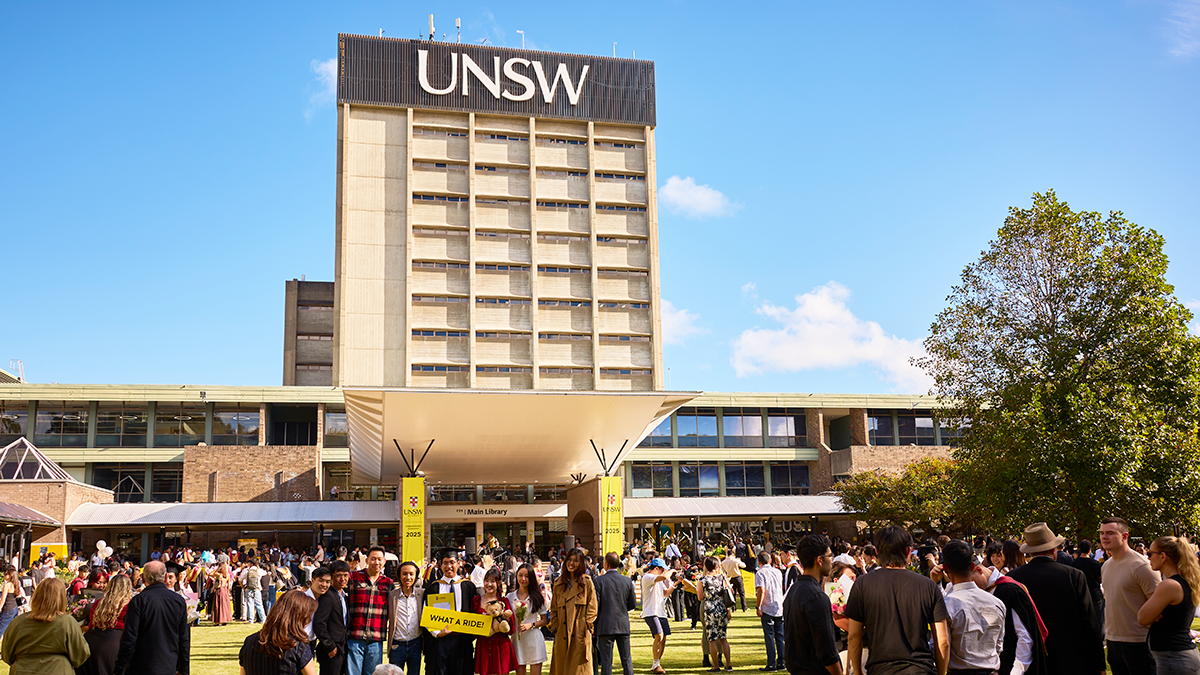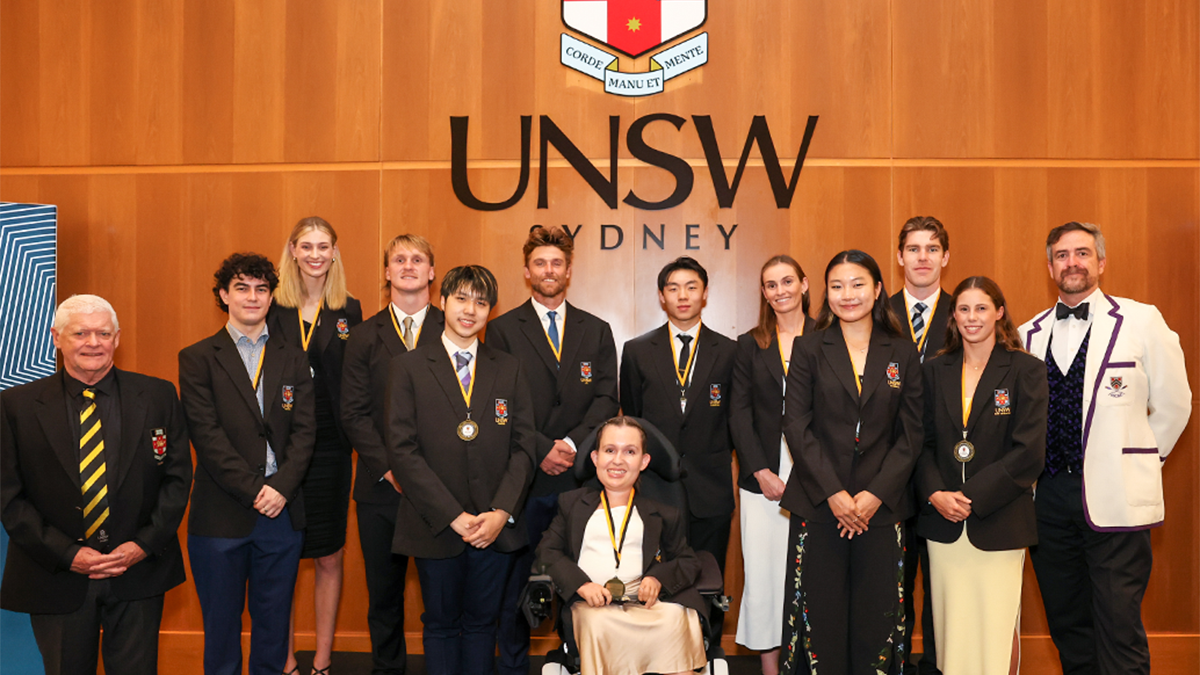
Dear colleagues
I hope, like me, you enjoyed the vibrant and celebratory atmosphere during last week’s March Graduation Festival. More than 20,000 guests and graduates attended UNSW’s Kensington campus across 28 ceremonies in two venues, with 4600 graduates receiving 5900 awards. Impressive! Graduation Festival is one of the absolute highlights of campus life. There’s a sense of accomplishment that comes from years of hard work, mixed with optimism and excitement about the future. A special thank you to the Graduations and Graduation Events teams for making it a truly memorable experience for our newly minted graduates and supporters. Their contagious energy was a wonderful reminder of our impact and purpose in education and research.


UNSW’s ongoing commitment to equity, diversity and inclusion
Amid current global public discourse about the importance of equity, diversity and inclusion and initiatives that promote EDI throughout organisations and society more broadly, I would like to reemphasise UNSW’s unwavering commitment to aspiring for best practice equity, diversity and inclusion approaches within our University community and beyond.
Tackling equity, diversity and inclusion challenges are integral to the continued success of UNSW and our ongoing pursuit of excellence. Ensuring that we – as students, colleagues or partners – enable and appropriately support all segments of society for success, regardless of gender, socio-economic status, cultural diversity, sexual orientation or disability is critical for advancing our UNSW Strategy: Progress for All.
As I say often, UNSW is our people. The wonderful diversity of knowledge, experiences and perspectives enables UNSW to carry out our core functions of education, research and engagement with the world as we pursue our vision for positive societal impact. Beyond appropriately ensuring equity, achieving academic and organisational excellence requires us to incorporate the great breadth and depth of talent that is inherent in society. Actively valuing equity, diversity and inclusion is essential in this quest. We will continue to encourage everyone in our community to bring their whole selves to University and to realise their, and our, potential.
Our University’s steadfast, ongoing commitment to EDI is codified in several ways, including in the:
- UNSW Code of Conduct and Values
- UNSW Equity, Diversity and Inclusion Policy
- UNSW Values in Action
- UNSW Strategy: Progress for All and UNSW Societal Impact Framework.
Thank you to everyone in the UNSW community who upholds the principles, commitments and expectations set out in these documents. If you’ve not read them lately, I encourage you to refamiliarise yourself with their contents.
I would also like to remind you that support is available for students and staff who have been affected by negative characterisations of EDI principles, programs and initiatives in recent times.
- Students can seek wellbeing support via student.unsw.edu.au/wellbeing.
- Staff and their immediate families who would like support can contact the Employee Assistance Program through wellbeing.unsw.edu.au/eap.
Please continue to look after one another with the generosity inherent in the UNSW community.
Support for people affected by the earthquake in Myanmar
I would like to acknowledge the devastating loss of life and injury following the earthquake in Myanmar on Friday. The distress caused by a natural disaster can be amplified when we are far from home and loved ones, and I offer my sympathy to people in the UNSW community with connections in Myanmar and affected parts of neighbouring Thailand.
As natural disasters such as this earthquake continue to have significant impacts on people around the world, I thank colleagues whose research, expertise and education aim to reduce risk, build resilience and facilitate recovery for affected communities.
The Division of Education & Student Experience has been in contact with the Myanmar Student Society and will be offering support to those who have been impacted.
Information about support services for students and colleagues is available via these links:
- Students can seek wellbeing support via student.unsw.edu.au/wellbeing.
- Staff and their immediate families who would like support can contact the Employee Assistance Program through wellbeing.unsw.edu.au/eap.
Professor Michael Kidd AO appointed Australia’s next CMO
I’m delighted to share the news that Professor Michael Kidd AO has been appointed as Australia’s new Chief Medical Officer (CMO). Michael is the Director of the International Centre for Future Health Systems (ICFHS) at UNSW, a research, policy and advocacy centre that promotes sustainable, equitable and person-centred health care for all people.
Michael is a highly respected medical leader known for his significant contributions to public health and primary health care, in Australia and internationally. He has served as president of the Royal Australian College of General Practitioners and the World Organization of Family Doctors. He is Professor of Global Primary Care and Future Health Systems at the University of Oxford. During the COVID-19 pandemic, Michael served as Deputy Chief Medical Officer and Principal Medical Advisor with the Australian Department of Health and Aged Care.
I would like to thank Michael for leading the establishment of the ICFHS and congratulate him on his appointment as Australia’s new CMO. Michael’s appointment begins in June.
UNSW-designed MICROfactorie an e-waste gamechanger
It was exciting to be part of the recent opening of the UNSW-designed Plastics Filament MICROfactorie at the Renew IT facility in Lane Cove.
The Plastics MICROfactorie module, developed by and licensed to the UNSW Centre for Sustainable Materials Research and Technology (SMaRT), changes the way we think about waste and resources. The technology reforms hard plastics from e-waste that would have been destined for landfill or low-value palletisation into high-value filament for 3D manufacturing and printing. The Renew IT installation is the first commercial operation and use of the technology in the world outside of the UNSW SMaRT Centre.
Recovering materials from waste has a big role to play in reducing our carbon footprint. Renew IT’s Plastics MICROfactorie module has already brought significant benefits, so far keeping 50.4 tonnes of plastic waste out of landfill and incinerators. The technology is creating a circular economy where materials are used over and over again, maximising the value of our resources.
The pioneering work of Scientia Professor Veena Sahajwalla and her team at SMaRT is driving industry change through sustainable engineering and material innovation. It’s a wonderful example of how UNSW’s groundbreaking research and collaborative partnerships are creating a more sustainable future.
Universities’ productivity role highlighted at Business Sydney event
Earlier this month I gave an address at a lunch hosted by Business Sydney. I spoke about universities’ vital role in reigniting Australia’s productivity, which has been stagnant for far too long, and ensuring it is done in a broad-based way to benefit the whole of society.
Australia has just experienced a decade of the lowest productivity growth in 60 years. This has significant implications for our standard of living and our international competitiveness. For the first time in Australian history, the youngest generations are forecast to have a lower standard of living than their parents. The national cost of living and housing affordability crises are rooted in the productivity crisis.
According to the Productivity Commission, productivity growth needs two things: new ideas to be discovered, and new ideas to be applied or used. Universities are critical for satisfying these preconditions for productivity growth: discovering new ideas – which we do through cutting-edge research; and applying them – which we do by equipping the workforce with new knowledge and skills.
That’s why I called for a compact between universities and government that commits us to work together to support business and the community in boosting productivity, addressing the housing and cost of living crises, closing equity gaps and increasing prosperity for all.
I’m excited about what universities can achieve in partnership with government and with business. Productivity is a critical challenge for Australia, but if we make a deliberate choice to tackle it as a collective, we can reignite national productivity for the benefit of generations to come.
You can read more about my call to jointly tackle the productivity crisis in my address at Business Sydney or in Julie Hare’s article in The Financial Review.
NSW Higher Education Strategy launch
It was an honour to host the launch of the NSW Higher Education Strategy at UNSW last week. We welcomed guests including The Hon. Steve Whan, NSW Minister for Skills, TAFE and Tertiary Education; Murat Dizdar, NSW Department of Education Secretary; and my vice-chancellor colleagues Professor Alex Zelinsky AO, Vice-Chancellor of the University of Newcastle; Professor George Williams AO, Vice-Chancellor of Western Sydney University; and Senior Professor Eileen McLaughlin, Interim Vice-Chancellor of the University of Wollongong.
The NSW Higher Education Strategy seeks to foster public partnerships that build a sustainable higher education sector that meets the needs of students and the state. It recognises universities as a vital resource and will champion strengthened partnerships between universities, government and industry in NSW – partnerships that are crucial for our economic and social prosperity. The launch included a tour of the School of Photovoltaic and Renewable Energy Engineering’s Solar Industrial Research Facility, highlighting how UNSW is already having a positive impact for NSW.
The NSW Higher Education Strategy’s priorities include supporting current and future skill and workforce needs, improving equity outcomes in higher education and harnessing talent, expertise and research for the greater good. The strategy complements the UNSW Strategy: Progress for All as we continue to focus on partnerships for the benefit of the broader community.
Work on the development of our new academic calendar continues
Thank you to everyone who provided feedback on the two calendar options under consideration. A summary of the key themes from student and staff feedback is available on the project website under Give your feedback. The University Leadership Team has been reviewing both options against a range of factors, including these valuable student and staff insights as well as which option best advances our new Strategy. We will keep you informed as the process progresses. You can read more about our Academic Calendar Project on the website.
Sporting excellence celebrated at UNSW Blues Awards
I had the pleasure of attending the Blues Awards earlier this month, celebrating the outstanding achievements of UNSW athletes who have excelled in their sporting and academic pursuits. The Blues Awards hold great tradition at UNSW. For 70 years the Blues have recognised students who have risen to the highest levels of their chosen sports. The awards mark the extraordinary talent and dedication of individuals who give their all – not only as the highest achievers on the sporting field, but as people of good character.

As I listened to their acceptance speeches, a few common themes stood out: humility, generosity, and a strong commitment to using their talents to give back to the community. These student-athletes are excellent ambassadors of all that our University values. A huge congratulations to our Blues recipients! Read a full wrap up in the UNSW Sport website.
Pictured with me above (L–R): Dr Anthony Hughes (former Blues winner), Aedyn Pratley (fencing), Olivia Coleman (netball), Jacob Preston (NRL), Peam Palakawongse Na Ayutthaya (fencing), Dane Rampe (AFL), Jamieson Leeson (boccia), Ricky Tang (badminton), Caitlin Cronin (rowing), Chloe Wan (handball), Marcus Della Marta (rowing) and Sophie Ferenczi (surf lifesaving and cross country). Blues winners who were unable to attend due to sporting commitments: Emma Bosco (mogul skiing), John Hedges (water polo), Matt Byrnes (water polo), Nathan Power (water polo), and Nikolas Pender (rowing).
There’s more to read Inside UNSW…
- This week’s staff profile of Marlon Cabrera is truly inspiring. His story is one you won’t forget!
- Four UNSW early and mid-career medicine and biomedical engineering academics have been awarded prestigious grants from Cancer Institute NSW. Congratulations Dr Thanh Nho Do, Dr Fei Deng, Dr Carolyn Mazariego and Dr Shona Ritchie!
- Congratulations to Professor Maria Kavallaris AM, Founding Director of the Australian Centre for NanoMedicine at UNSW, who has been named a Fellow of the American Institute for Medical and Biological Engineering (AIMBE).
Don’t forget to register for next Tuesday’s staff event on the Michael Birt Lawn. It’s an opportunity to take a break, catch up with colleagues and maybe play some lawn games (and I’m told there’ll be freshly baked biscuits and gelato!).
Best regards
Attila
Professor Attila Brungs
Vice-Chancellor and President
- Log in to post comments
